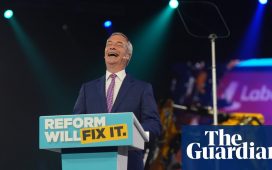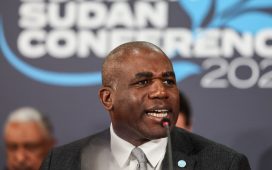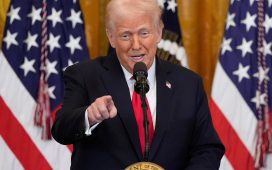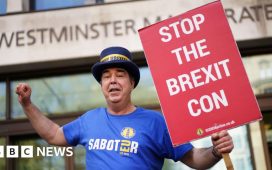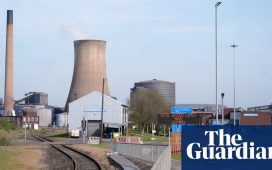By Davy Wilson and Chris Andrews, BBC News NI
 PA
PASinn Féin is now the largest party across Northern Ireland’s councils, assembly and at Westminster.
The nationalist party, which does not take its seats in the House of Commons, has seven seats after Thursday’s UK general election, the same number as in 2019.
Its leader, Mary Lou McDonald, said it was time to “prepare for a new future together on this island”.
The party came out on top after a disappointing night for the Democratic Unionist Party (DUP).
The DUP had eight seats in 2019 and returns in 2024 with five.
Its most high profile casualty in Thursday’s vote was Ian Paisley, who lost the North Antrim seat his father had first won in 1970.
In Lagan Valley, Sorcha Eastwood of the Alliance Party took the seat which had been held by the former DUP leader Sir Jeffrey Donaldson since 1997.
Robin Swann of the Ulster Unionist Party (UUP) won in South Antrim at the expense of the DUP’s Paul Girvan.
 PA Media
PA MediaFor Sinn Féin, there was a 4.2% increase in vote share compared to the general election five years ago.
The party also welcomed new faces, including Dáire Hughes and Cathal Mallaghan.
Former Royal College of Nursing leader Pat Cullen, a prominent figure during recent UK health strikes, was returned for Sinn Féin in Fermanagh and South Tyrone.
Ms McDonald said Sinn Féin was “determined to build a constructive relationship with the new Labour government”.
She said her party expected the new prime minister “to uphold the Good Friday Agreement, which Labour helped deliver, ensuring its political, legal, and constitutional guarantees are respected”.
Elsewhere, the Labour Party won a landslide victory, with Sir Keir Starmer installed as the new prime minster.
There was a 250-seat collapse for the Conservatives, with gains for the Liberal Democrats and Reform UK.
 Pacemaker
PacemakerWho has been elected in Northern Ireland?
The first seismic result of the night came in Lagan Valley, where Sorcha Eastwood became both the constituency’s first woman and first non-unionist MP.
She defeated the DUP’s Jonathan Buckley, who was contesting the election instead of Sir Jeffrey, who has been charged with historical sex offences, which he denies.
Ms Eastwood said she was delighted with her win, adding the party’s result was a “huge achievement”.
“I am a Lagan Valley girl born and bred,” she added.
Mr Buckley said “boundary changes” and “divided unionism” lost him the seat.
 Pacemaker
PacemakerIn North Antrim, in a major upset, the DUP’s Ian Paisley lost the North Antrim seat to Traditional Unionist Voice (TUV) leader Jim Allister, who described the result as “seismic”.
The TUV, which is aligned with Reform UK, had been highly critical of the DUP’s deal to bring the party back into power-sharing government in Northern Ireland.
The Social Democratic and Labour Party (SDLP) returned with its two MPs, Colum Eastwood in Foyle and Claire Hanna in Belfast South and Mid Down.
‘Strategic planning’
Robin Swann’s win in South Antrim means the UUP has an MP for the first time since 2017.
He stepped down as health minister for the race, which party leader Doug Beattie described as “strategic planning and we planned well”.
In North Down, there was a return to an independent unionist voice at Westminster.
Alex Easton, formerly of the DUP, defeated Alliance Party deputy leader Stephen Farry.
 Pacemaker
PacemakerElsewhere, here’s who have been elected in Northern Ireland:
- Sinn Féin’s Cathal Mallaghan was the first Northern Ireland MP elected, topping the poll in Mid Ulster
- DUP leader Gavin Robinson retained his seat in Belfast East despite the challenge of Alliance leader Naomi Long
- Her colleague Sorcha Eastwood won in Lagan Valley, a seat long-held by the DUP
- The DUP’s Carla Lockhart, Sammy Wilson and Jim Shannon retained their seats in Upper Bann, East Antrim and Strangford respectively
- Gregory Campbell from the party also retained his East Londonderry seat, but it came after a surprisingly close fight with Sinn Féin’s Kathleen McGurk
- Sinn Féin’s Órfhlaith Begley retained her seat in West Tyrone as did her party colleagues Chris Hazzard in South Down, John Finucane in Belfast North and Paul Maskey in Belfast West. Dáire Hughes also won for Sinn Féin in Newry And Armagh, replacing Mickey Brady who opted not to run
- Former nursing union boss Pat Cullen held Fermanagh and South Tyrone for Sinn Féin
- The SDLP’s Claire Hanna also held onto her seat in Belfast South and Mid Down as did party leader Colum Eastwood in Foyle
Analysis: Brendan Hughes – BBC News NI political reporter
Ian Paisley losing his seat in North Antrim is the political earthquake that no one saw coming.
For 54 years the seat has been a family dynasty, synonymous with the Paisley name – and the entire DUP.
It was held by the DUP’s founder Rev Ian Paisley since 1970 before his namesake son succeeded him in 2010.
But now it will be TUV leader Jim Allister representing North Antrim in the House of Commons.
His alliance with Reform UK was looking shaky after its leader Nigel Farage personally endorsed Paisley.
But TUV objections to the DUP’s deal to restore Stormont seem to have cut through, enabling Allister to overturn a DUP majority in the party’s heartland.
For Allister, dismissed by the DUP as a “dead-end unionist”, this will be the sweetest of victories.
 Pacemaker
PacemakerIn total, 136 candidates stood in Northern Ireland in the first general election since 2019.
It operated as first past the post, which means voters put an X in the box beside one candidate who they want to be elected to the House of Commons.
The number of registered voters in Northern Ireland was the largest it has ever been for a general election – 1,363,961.
However, turnout was 57%, down 4.5% since 2019.



